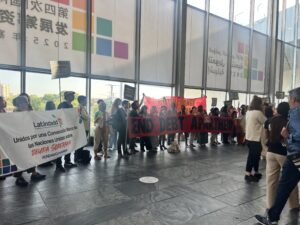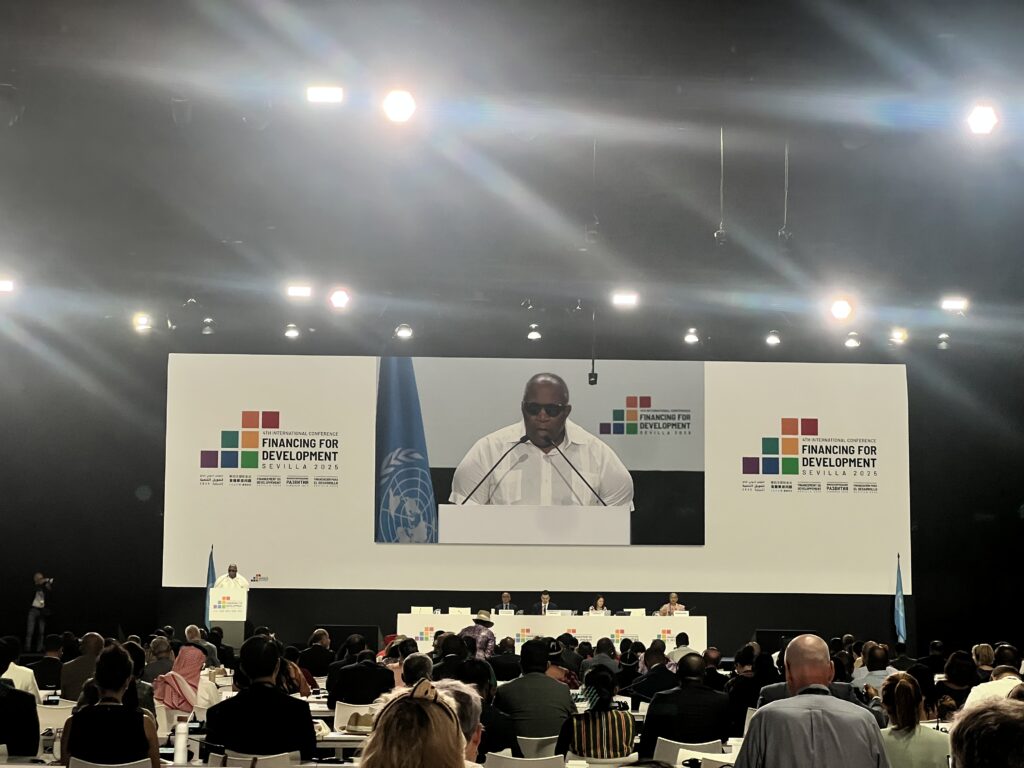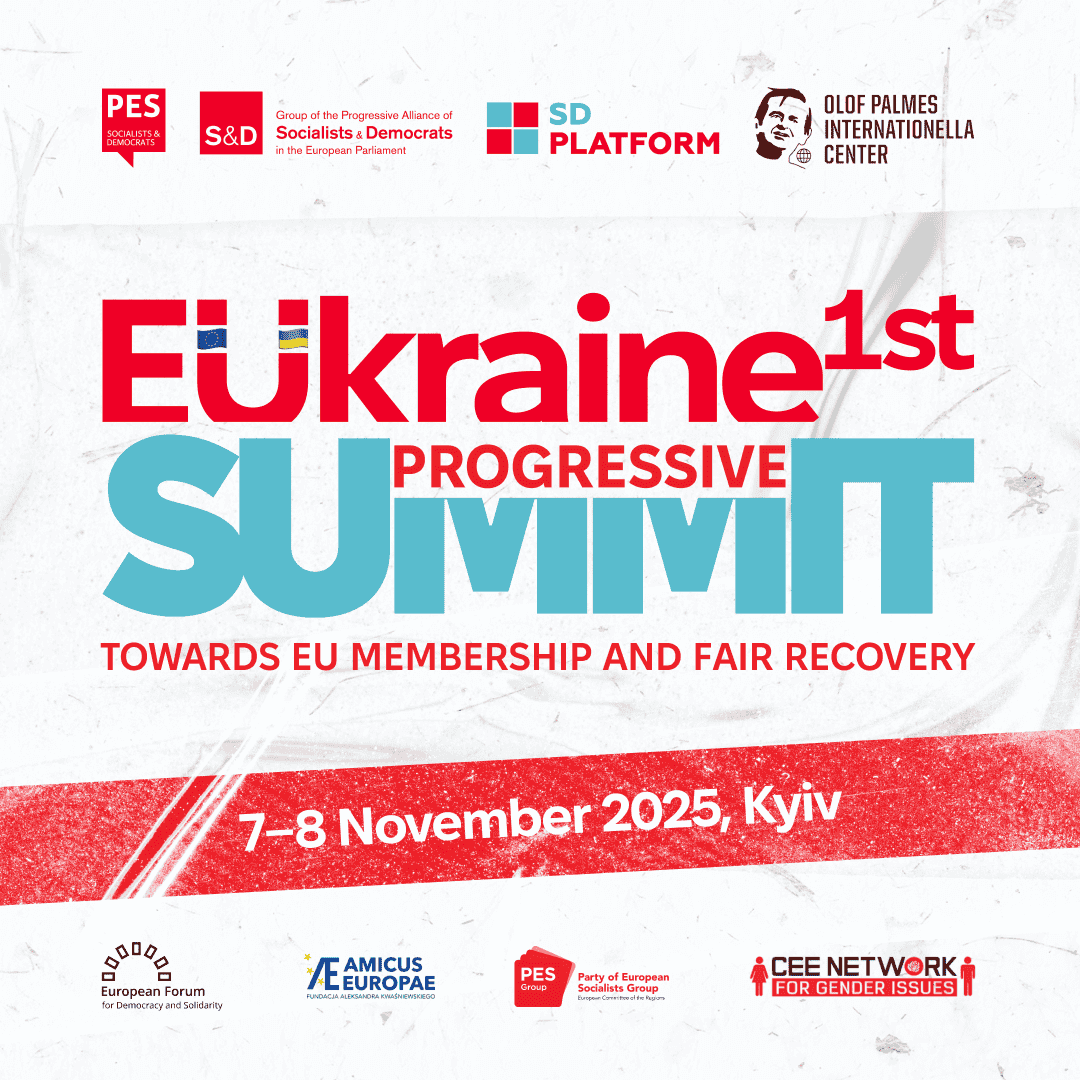In a world increasingly marked by geopolitical bloc thinking, rising protectionism and growing global inequality, a UN summit took place in Seville at the end of June 2025: the Fourth International Conference on Financing for Development (FfD4). The FMS was there. Not only to listen and learn, but also to take a critical look at the direction of international cooperation. The central question remained up in the air throughout the conference: who actually sets the conditions for development, and in whose interest?
From solidarity to market protection?
Although FfD4 held the promise of becoming a milestone in reforming the global economic order, the cards were largely shuffled in advance. The "Compromiso de Sevilla", the final document of the conference, had already been largely prepared in New York and negotiated behind closed doors. This left little room for real political discussion, let alone participation from civil society or partners from the Global South.
A key issue was the dominant presence of private parties: almost 40% of the more than 15,000 participants were from the business community, compared to only a fraction of that number of representatives from NGOs and diaspora organisations. Themes such as blended finance and de-risking dominated the agenda, while mechanisms for public accountability and transparency remained underexposed. The EU's Global Gateway strategy, using already limited public resources to boost private investment in infrastructure, was also presented as the European success story. At the same time, studies by Oxfam, Counter Balance and Eurodad show that of the projects under Global Gateway, the majority mainly favour European companies and only a small proportion directly contribute to development in low-income countries. This illustrates the tension between investors' economic interests and the promised development impact.
Given these risks, the current emphasis on private finance and blended finance in FfD4 and EU's Global Gateway has been seen as problematic by civil society. Without clear public direction, transparency and inclusive decision-making, incoherence, fragmentation and conflicting priorities can arise, sidelining local communities and limiting the promised development impact. In contrast, a nuanced strategy that complements private resources but places public accountability and participation at its core does offer opportunities to effectively achieve the SDGs and ensure sustainable development for all.
Private influence in OS
Private influence in development cooperation is not always the same; the effects vary greatly by project type. Here a quick run-down of the forms of interventions that are discussed at FfD4 and in general when talking about private influence in OS: blended finance, direct private investment and company-NGO collaborations.
- Blended finance, combining public funds with money from private investors, can attract a lot of money and enable new projects. At the same time, the focus is often too much on profit rather than social impact. For example, a project that finances low-cost housing through private investment can even lead to displacement of poor residents or ecological damage locally, and projects can work against each other instead of working together.
- Direct private investments (FDIs), such as new factories or infrastructure projects, can create jobs and bring technology, but also bring risks: potential exploitation of workers, dependence on foreign companies and unequal benefits between richer and poorer groups.
- Company-NGO collaborations or inclusive business models can strengthen local capacities and provide market access for low-income groups. But experiences in Ghana and Kenya show that participation is often superficial, the most marginalised are excluded and success is measured in "reach" rather than actual empowerment.

Dutch national commitment at FfD4
The Dutch engagement during FfD4 reflected and illustrated the risks discussed above. In line with the recent Netherlands First agenda, the outgoing cabinet under Minister Klever (PVV) placed particular emphasis on cooperation with institutional investors and private initiatives. This example shows how public development finance (ODA) is coming under pressure, while private forms of financing are gaining the upper hand.
The much repeated discourse at FfD4 was that official development assistance (ODA) is obsolete. Yet ODA remains a crucial source of funding for many low- and middle-income countries. While public-private partnerships can lead to positive results, transparency, due diligence (the obligation for companies to investigate the extent of their involvement in human rights and environmental abuses) and public scrutiny must remain central to ensure sustainable and inclusive impact.
How next?
Despite the dominant market focus, hopeful developments were also visible. The support for the UN Tax Convention (A UN agreement that lays down rules on how countries may tax to avoid double taxation on income, and represents a success of CSOs' lobbying and engagement during previous Financing for Development Conferences), shows that systemic change is possible. Years of CSOs' commitment to fair and inclusive decision-making on taxation led to a breakthrough: in late 2024, the mandate was adopted to negotiate a UN Tax Convention, with negotiations in 2025-2027 as a concrete follow-up phase. This provides an example of how political will and international solidarity can achieve structural reform, including a fairer tax and financing model for developing countries.
What does this mean for the Netherlands?
Financial and trade policies, such as financial arrangements for development, are technical, always political and never neutral. The "Compromiso de Sevilla" may be a disappointing compromise, but it is also a starting point with concrete starting points for further reform.
In the run-up to the Lower House elections in October, an important question arises: what course does the Netherlands choose in terms of international cooperation? Do we continue to follow a model in which international solidarity is subordinate to economic self-interest, or do we dare to formulate a vision in which public responsibility, global equality and democratic control take centre stage again?




